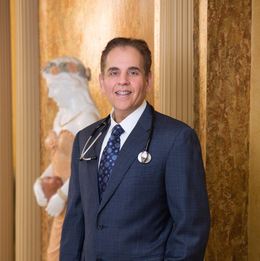
The goal of any medical provider is to help patients prevent serious disease, identifying potential risks and addressing them before they cause any damage. However, Integrative cardiologist Dr. Vic Bahal, founder of Advanced Cardiology of South Jersey, says not enough physicians are focusing on prevention. Unfortunately, this oversight could lead to undiagnosed conditions and puts patients at serious risk.
Dr. Bahal shared some important facts and uncommon knowledge with Suburban Family about heart disease and how to prevent it.
The Root Cause
In the matter of heart disease, inflammation is the No. 1 culprit.
“Research has shown inflammation is the root cause of heart and vascular disease,” says Dr. Bahal. “Inflammation creates plaque production in arteries, and if they rupture, could cause a heart attack or stroke. Plaque doesn’t discriminate. It can form on the artery going to your brain, legs, aorta, etc. Once there is enough, it ruptures.”
Common causes of inflammation are obesity, artificial flavors and sweeteners, stress levels, unhealthy diet, smoking and genetics to some degree, to name a few.
Endothelial Function Testing
In medical terms, inflammation is identified as endothelial dysfunction, and Dr. Bahal is the only cardiologist in South Jersey offering Endothelial Function Testing. This 15-minute, noninvasive test is covered by most insurance plans and can identify damage from chronic inflammation. Testing can also be used in patients with existing heart disease to help adjust treatment accordingly.
From there, he approaches treatment with Integrative Cardiology, a revolutionary treatment concept that combines conventional medicine, coupled with nutraceuticals and supplements, along with lifestyle modifications and other wellness practices such as meditation, yoga and even hormone balancing.
The Silent Killer
Hypertension, or High Blood Pressure, is known as the silent killer and increases the risk for heart disease, heart failure and stroke, among other things. It affects approximately one in three adults in the U.S., and in 2019, was a primary or contributing cause in the death of more than 500,000 people, according to the CDC. Hypertension gets its foreboding name because it shows little or no symptoms, and can easily be missed in a one-time reading at the doctor’s office.
“One blood pressure reading tells us nothing. There are several factors to consider to get the most accurate picture of a patient’s blood pressure,” Dr. Bahal says.
Normal blood pressure is 120/80. The top number is known as systolic pressure, the pressure in your blood vessels when your heart beats; and the bottom number measures the force of blood in your arteries while your heart is relaxed between beats, called diastolic pressure.
High blood pressure might be indicated when those numbers change, but the readings in a doctor’s office could be affected by certain factors during a patient’s appointment.
“There is something known as ‘White-Coat Hypertension,’ which means a person could have normal blood pressure at home, but when they come into the office, it’s high because they are worked up or nervous,” says Dr. Bahal. “There is another one called ‘Masked Hypertension,’ in which the blood pressure is high at home, perhaps due to work or personal stress, but normal at the doctor’s.”
The only way to get a full picture of a patient’s blood pressure is with remote monitoring, continues Dr. Bahal. Remote blood pressure monitoring is a new technology that Dr. Bahal is offering in his practice. This allows patients to take blood pressure readings at various points in the day—from their own home or workplace with a special computerized cuff provided to the patient—and the information is relayed electronically to Dr. Bahal, who now has a more accurate picture for treatment. It can also alert Dr. Bahal in real-time if a reading goes out of range and the patient may be at risk.
Natural Ways to Reduce Inflammation
Supplements are a core component, he says. Quintuple board-certified in Internal Medicine, Cardiology, Vascular Medicine, Anti-Aging/Functional/Regenerative Medicine and Integrative Cardiology, Dr. Bahal has learned so much about how different supplements can be applied to treat different ailments not just for the heart, but in the whole body.
“Supplements such as CoQ10, combined with LCarnitine (an amino acid), fish oil, Berberine, Alpha Lipoic Acid and vitamin D help reduce inflammation,” Dr. Bahal says. “This is not like walking into a supplement store or just ordering at random online. Patients need to go to someone who understands the nutraceutical benefits and purity of supplements. The regimen is medically supervised by me and customized for each individual.”
Weight loss and proper nutrition are also incorporated into the treatment plan. Dr. Bahal recommends the Mediterranean diet and a BMI under 25. For over 14 years, Advanced Cardiology of South Jersey has run a successful weight loss program that has helped thousands of people. “Excess fat is toxic and creates cytokines which produce inflammation,” he says. “Along with whole grains and fruits, I also recommend spices like cumin, black pepper, onions, cayenne and garlic for their anti-inflammatory benefits.”
In many cases, hormone balancing and probiotics will be used as well. “About 70% of your immune system is in your gut. Reducing inflammation—viruses, bacteria, fungi—in the gut has a key cardiovascular benefit and we routinely use probiotics to balance it,” Dr. Bahal states.
Advanced Cardiology of South Jersey
4 Burton Lane, Suite 100 | Mullica Hill
(856) 241-3838
AdvancedCardiologySJ.com
Photography by Alison Dunlap
Published (and copyrighted) in Suburban Family Magazine, Volume 12, Issue 9.
For more info on Suburban Family Magazine, click here.
For information about advertising in Suburban Family Magazine, click here.
To find out where to pick up your copy of Suburban Family Magazine, click here.




